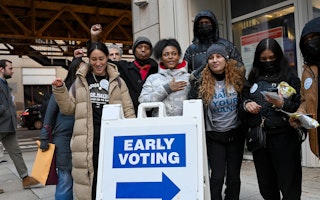Starting a New Conversation with Young Black Males
By Ivory Toldson

For decades, our conversations with young black males have focused on the wrongs that they do and the odds that are against them. Often, young black males’ voices are set against the backdrop of haughty social invectives and shortsighted analyses of their problems. The dialogues we have with them typically assume their current environment and behavior are debased beyond anything witnessed in modern history, which we justify through relentlessly repeating ill-conceived and poorly sourced statistics.
I have certainly been party to well intentioned, but often inept, discussions with and about young black males; however, in Milwaukee we started a new conversation with them at “Mile in My Shoes.” On November 19, 2012 more than 130 attendees gathered to hear a panel of young African-American males speak about their academic and personal experiences. The event was sponsored by Open Society Foundation Campaign for Black Male Achievement.
Originally designed to be a nonpartisan panel discussion with educational experts, administrators and policymakers, planning for “Mile in My Shoes” became stalled due to philosophical differences among scheduled panelists. Therefore, my staff and I decided to try something different: instead of experts, administrators and policymakers talking about what is best for young black males, we decided to allow young black males to speak for themselves.
Representative Gwen Moore (WI-04) and Milwaukee Public Schools Superintendent, Dr. Gregory Thornton gave opening remarks. After their short introductions, they took a seat on the front row and listen to five young black men tell their stories. Tommy C. Walls, Jr., junior at Marquette University; Asa K. Fludd, senior at Francis Marion University; Demarius Jury, senior at Messmer High School; Darious Scott, junior at Vincent High School; and Jeremy Triblett, education and training coordinator for Urban Underground’s college, career and life-skill programs were the featured panelists.
The young men used intelligence, candor, insight and critical analysis to portray what schools, communities and families need to do to help them to fulfill their aspirations. The event reinforced the importance of a Mark Twain quote: “If we were supposed to talk more than listen we would have been given two mouths and one ear.” The advertising for the forum read, “Black male high school and college students discuss how to fix education for them… Will you listen?” More than one hundred participants did, and so can you.
If you want to start your own conversation, here are the questions that we used, based on the findings from Breaking Barriers: Plotting the Path to Academic Success for School-age African American Males.
- How do you feel about the way young black men and boys are portrayed in the media? Do you believe the media influences the way black males behave? Do you believe the media influences teachers’ perception of black males?
- Studies show that black males do better in school when they feel good about themselves. What can schools do to support positive feelings and attitudes among young black males?
- Studies show that black males do better in school when they are rested (8-9 hours of sleep) and have a diet that consists of healthy foods (cooked vegetables, raw vegetables, fruit, and whole wheat or rye bread). Do you agree? What are some obstacles you believe black males face to sleeping and eating well?
- Students’ future plans have a big impact on their success in school. How did you learn about your options to continue your education and pursue career opportunities in the future? What are some ways that schools can prepare black males for college and different careers they are interested in?
- How do you deal with peer pressure? Are pressures to be involved with drinking, drug use, or sex negatively impacting black males’ progress in school?
- Tell us about your family. How do they support your academic success? If you could give parents advice about how to raise a successful black male, what advice would you give?
- Black males are more likely to be arrested and to serve time in the juvenile justice system. Why do you think this is? What can society do to reduce the number of black males in the juvenile justice system?
- Tell us about your neighborhood and the church you attend. How do they support your academic success? If you could give advice about how communities and churches can promote success among black males, what advice would you give?
- What do you think about school in general? Are you ever bored by school activities? Are you ever excited by school activities? What separates a boring school from an exciting school? What are some extracurricular activities that every school should offer?
- What do you think about your teachers? Tell us about your favorite teacher. Why is he/she your favorite teacher? Tell us about your least favorite teacher (please do not say the name). Why is he/she your least favorite teacher?
- What do you think about the rules you are expected to follow at your school? Do you understand all the rules? Are the rules fair?
- Why do you think black males are the most likely to be suspended? Do you think we suspend too much? What are some ways we can address problem behavior without suspending?
Ivory A. Toldson is senior research analyst at the Congressional Black Caucus Foundation (an Open Society Foundations grantee), associate professor of counseling psychology at the Howard University School of Education, and editor-in-chief of the Journal of Negro Education.


